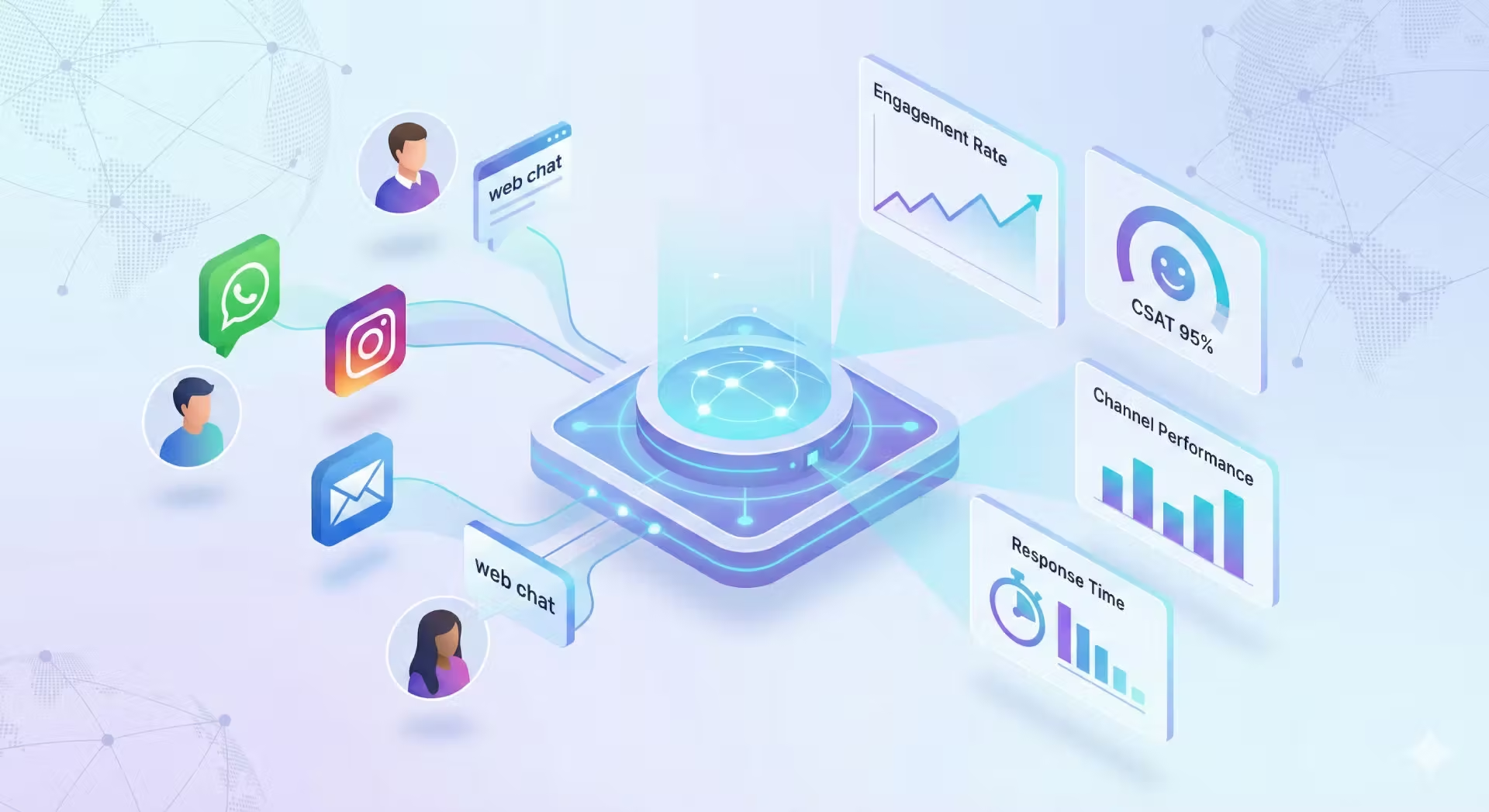You've probably heard it before, Artificial intelligence (AI) customer service is revolutionising the way businesses interact with their customers. Even though 'revolutionising' is a big word, and perhaps used a bit too much AI really is changing the way businesses are able to communicate with customers.
The majority of professionals (61% according to HubSpot) believe AI will augment customer service roles by 2024. And this paints a collaborative future ahead.
That's why in this article I will give you an introduction to AI in customer service. Exploring its transformative potential, how your solutions — like your customer engagement platform — are pivotal in making AI manageable, while harmonising AI capabilities with your team and their invaluable human touch.
Understanding AI customer service
AI customer service leverages advanced technologies such as:
- chatbots
- natural language processing (NLP)
- machine learning
Making for a powerful combination that can enhance customer interactions and streamline customer service operations. And the possibilities seem to be endless, as AI can be used to:
- interpret customer inquiries
- predicting customer needs
- provide immediate responses
- personalise interactions
- allow businesses to operate around the clock, ensuring that customers receive immediate assistance at any time of the day
- escalate complex issues to service and support teams when necessary
The evolution of AI in customer service marks a significant shift from traditional, manual processes to more efficient, automated solutions.
The transformation is highlighted by the expected growth in the global chatbot market. It is projected to reach $27,297.2 million by 2030, with a Compound Annual Growth Rate (CAGR) of 23.3% from 2023 to 2030, according to Grand View Research, Inc.
This surge reflects businesses' increasing investment in AI, and probably also reliance on AI, to meet the demand for instant, on-demand customer support.
Benefits of AI in customer service
By leveraging machine learning algorithms, AI enhances the efficiency of customer service teams. It provides them with the tools to deliver personalised and timely responses.
So in short what are the benefits of AI customer service:
- Enhanced efficiency and productivity
AI-driven tools, such as chatbots and automated response systems can handle routine customer inquiries. This frees up human agents to focus on handling complex customer asks.
- Improved customer satisfaction
By offering 24/7 support through AI, you ensure that help is always available, regardless of the time of day. This constant availability improves customer satisfaction.
- Increase of customers feeling valued
AI's ability to analyse customer data and personalise interactions means that customers feel understood and valued.
- Reduced costs
The automation of routine tasks leads to a more efficient use of resources within your customer service teams. By reducing the need for a large team of customer service agents to handle basic inquiries, you can allocate their human resources more effectively.
Increasing the value of your business
According to McKinsey's 2020 research, in the realm of global banking alone, AI technologies have the potential to deliver up to $1 trillion of additional value each year. A considerable portion of this value uplift is attributed to the advancements and efficiencies gained in customer service. You can use AI to unlock new levels of productivity and customer engagement, leading to increased revenue and growth opportunities.
💡This transformative potential underscores the strategic importance of AI in not only improving day-to-day operations but also in driving long-term business value.
Where exactly can AI help your customer service?
AI customer service will help your teams to:
- Boost your automated customer support: AI can provide more advanced support through virtual assistants. These assistants can understand natural language, interpret complex queries, and offer personalised advice, solutions, or escalate issues when necessary.
- Solidify your omnichannel support: AI can unify customer service across multiple channels (e.g., email, social media, messaging apps) to provide a cohesive and consistent customer experience. This ensures that customers receive the same level of service regardless of how they choose to interact with a business.
- Personalise: AI algorithms can analyse customer interactions and feedback to provide personalised experiences, product recommendations, and services. This level of personalisation enhances customer engagement and satisfaction by making customers feel understood and valued.
- Handle issues, challenges efficiently: AI can quickly access customer histories, account details, and other relevant information to offer rapid and accurate issue resolution. This efficiency reduces waiting times and improves overall customer satisfaction.
- Add channels, such as voice recognition and natural language processing (NLP): Beyond text-based interactions, AI can offer voice-based customer service through speech recognition and NLP. This allows for more natural and convenient customer interactions, especially for those who prefer speaking over typing.
AI customer service will help your team leads to:
- Run predictive analyses: AI can analyse customer data to predict future behaviour, enabling businesses to proactively address potential issues or offer tailored recommendations. This predictive capability will give you the input to personalise plus improve customer satisfaction and loyalty by anticipating and meeting customer needs before they arise.
- Dive into sentiment analysis: AI can evaluate customer feedback, reviews, and interactions to gauge sentiment and emotional tone. This insight helps businesses understand customer satisfaction levels, identify areas for improvement, and tailor their communications to address customer sentiments effectively.
Implementing AI in customer service
Implementing AI in customer service is a strategic move that demands a well thought out plan. You should approach integration with clear goals in mind such as to enhancing team efficiency, increasing retention or generating more leads.
It is essential that you start with a clear understanding of your customers' needs and how AI can meet those needs. To do this you can start by researching what's out there, to find the ones that best align with your specific business needs.
Here are some key things to consider:
- Choose the right AI tools: The choice of what AI technologies to use should be made while taking into consideration their ability to work alongside customer service teams to handle customer conversations. For example, generative AI technologies have the capability to produce text that closely mimics human writing styles. This is particularly useful in customer service for creating responses that feel personal and empathetic, rather than automated and impersonal. When customers receive responses that seem as though they were written specifically for them, it enhances their experience and satisfaction with the service.
- Training and empowering customer service teams: Implementing AI in customer service teams requires training for those teams. This training should focus on how to manage AI tools, interpret their outputs, and how to use them to deliver branded and personalised customer service. You need to find tools that your team will be able to understand and use to their full potential after their training. There may be AI tools out there with incredible features but if your team is unable to use them, they will have no impact.
- Enhance your customer experience: The ultimate goal of AI implementation is often to improve the customer experience. This includes using AI to offer 24/7 support through live chat, quickly addressing common customer inquiries with generative AI, and providing personalised service recommendations. Find the tools that will help you best achieve the greatest number of goals.
Real-world applications of AI in customer service
AI customer service and support is changing how all kinds of businesses deliver customer service. Here are two examples of AI in customer service that may help inspire you to think of new ways to use this technology. Your customers will thank you for it.
BAS World: Automating lead generation 24/7
BAS World, Europe's largest truck and trailer dealer, faced a challenge in managing leads, especially outside of business hours. They implemented Trengo to automate their lead generation process and stop missing out on opportunities due to time constraints.
Through AI-driven Live Chat, BAS World now collects leads 24/7, supports over 10 languages, and integrates collected leads straight into their ERP system. This automation has led to a 70% increase in lead generation.
Stitch Fix: Personalising customer experiences with generative AI
Stitch Fix leverages generative AI to unlock value from billions of textual data points shared by clients, driving personalisation at scale. They integrate OpenAI’s large language models to understand textual client input, generating text that helps create personalised Fixes.
Furthermore, Stitch Fix's outfit creation model generates 13 million new outfit combinations daily, with each tailored to trends and client preferences. This application of AI in customer service not only speeds up the recommendation process but also delivers a highly personalised shopping experience.
Challenges and solutions of AI in customer service
Integration of AI into the day to day of customer service teams has many positives, however, it also brings some challenges.
Here are some of the most common ones and how to overcome them:
- Complexity in customer service delivery
The move towards digital-first customer interactions, has made digital servicing channels the preferred "first point of contact" for many customers. This transition is creating a greater reliance on contact centers and assisted-chat functions for handling more complex customer inquiries. The challenge here is to make sure that your digital channels can handle the complexity of inquiries, without compromising the quality of service.
💡Don't compromise on the quality of your service, whether you're using AI or automation. Take control of your engagement strategy and nail every conversation.
- Rising customer expectations
AI has started to set a high bar in day-to-day and more basic customer service. This has led to customers expecting similar results for more complex requests. You are now expected to have the speed and quality of customer service for these more complex requests, which means the implementation of more complex technology.
Many businesses are responding by adopting conversational AI, proactive nudges, and predictive engines to enhance their customer service However, this move towards a more sophisticated AI-driven service strategy means more training and adaptation from your team.
- Labor market constraints
As your business looks to fill crucial roles within your customer service teams, you may face the challenge of a smaller labor market. The demand for skills necessary to develop, manage, and optimise AI in customer service is outpacing the supply. A Gartner survey shows that talent shortages are the biggest adoption barrier to 64% of emerging technologies, including AI. This is leaving many team leaders struggling to find the talent needed to support their AI initiatives. So don't forget to train your teams! Because if you do, it'll add immense value to your teams and service.
Solutions and best practices
To overcome these challenges, businesses can adopt several strategies:
1. Embrace AI and human collaboration: Develop a balanced approach where AI handles routine inquiries, and complex cases are escalated to your team. This strategy can reduce the strain on everyone and ensure customers receive the right level of support.
2. Continuous training and upskilling: Invest in ongoing training for both AI systems and your customer service teams. Keeping AI algorithms updated with the latest data and trends is important. But you must also equip your teams with the skills to work alongside AI.
3. Customer education and communication: Be clear to your customers on what your AI-driven support channels can and cannot do. Setting realistic expectations can enhance customer satisfaction and reduce frustration with automated systems.
The future of AI in customer service
With the positives massively outweighing the challenges, the future of AI in customer service looks bright. We can expect to see enhanced customer experiences in the following years, driven by trends such as:
- Analytics and insights: The increasing investment in voice and text analytics, from 62% in 2021 to 81% in 2023 as reported by Deloitte, highlights the shift towards data-driven service strategies. These tools are crucial for analysing call/contact drivers, identifying 'at risk' customers, and evaluating service quality.
- Predictive customer service: Advancements in predictive engines and conversational AI are moving us towards more proactive customer engagement. This means that technology will soon help teams anticipate customer needs, leading to higher satisfaction levels.
- Collaboration between skilled workforce and AI: The future we see is one where there is a synergy between AI automation and the human teams. This collaboration will be key to handling complex customer interactions effectively.
AI customer service through your engagement platform
Trengo, a customer engagement platform, is harnessing the power of automation and AI to assist businesses in enhancing their self-service capabilities and personalise customer interactions.
Here’s how Trengo is setting a new standard in AI-driven customer service:
- Multichannel inbox: Be present on all channels, without overwhelming your teams. Ensure that all communication comes together in one overview, so your team is able to work from there. When they have a full overview of what's happening, customer profiles right next to conversations, and can use automation and AI to respond service will not just be fast but also of high quality.
- Personalisation: Trengo allows you to tailor your communication to match your brand, while equally tailoring conversations to customer needs. This ensures that every channel, through which you communicate with customers, is an integrated part of the customer experience and builds a greater sense of trust with your audience.
- Data insights: Trengo's platform leverages customer insights and will help your team evaluate service quality and optimise their processes. This leads to a more productive team that can focus on complex inquiries while automated systems handle routine inquiries.
And that's only scratching the surface. Trengo is looking into the possibilities that both AI and automation offer customer engagement. And by working towards a place where teams have all the tools they need to nail every customer conversation, Trengo is at the forefront of enhancing AI customer service in a way that benefits both your business and your customers.
AI customer service can help your team
AI in customer service is more than a trend; it's a transformation. Advancements in AI technology now means your business can offer personalised, efficient, and predictive services at scale. Service that meet the high expectations of today's digital-first consumers. As AI continues to evolve, its implementation into customer service strategies will not only continue to enhance customer experiences but also create significant value for your businesses.




.png)











